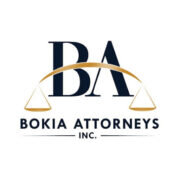Best General Litigation Lawyers in Midrand
Share your needs with us, get contacted by law firms.
Free. Takes 2 min.
List of the best lawyers in Midrand, South Africa
South Africa General Litigation Legal Articles
Browse our 2 legal articles about General Litigation in South Africa written by expert lawyers.
- South Africa Estate Planning and Inheritance for Foreigners
- South Africa practices "Freedom of Testation," allowing you to distribute your assets to anyone you choose, regardless of the "forced heirship" laws in your home country. A separate South African will is the most efficient way to manage local immovable property and prevents administrative delays at the Master of the... Read more →
- Suing for Medical Malpractice in South Africa - Legal Guide
- Medical malpractice claims in South Africa fall under the law of delict, requiring proof of negligence, causation, and actual damages. The standard prescription period for filing a claim is generally three years from the date the patient became aware of the negligence. Expert medical testimony is mandatory to establish whether... Read more →
About Litigation Law in Midrand, South Africa
Litigation law in Midrand, South Africa refers to the process of resolving disputes or enforcing rights through the court system. Midrand, as a rapidly growing commercial and residential area between Johannesburg and Pretoria, experiences a diverse range of legal disputes, spanning from civil matters like property, contract, and family law to commercial issues involving businesses of all sizes. Litigation typically involves formal court proceedings but can also include alternative dispute resolution methods such as mediation and arbitration, depending on the nature of the dispute and the preferences of the parties involved. Given South Africa's complex legal framework and court structures, navigating litigation in Midrand requires an understanding of both national laws and local court practices.
Why You May Need a Lawyer
Individuals and businesses may seek a litigation lawyer in Midrand for various reasons. Some common situations include:
- Being sued or wishing to initiate legal action against another person or entity
- Contract disputes involving service providers, landlords, tenants, or business partners
- Divorce proceedings or disputes involving children or maintenance
- Property or boundary disputes between neighbors or co-owners
- Employment termination or labor disputes
- Debt collection issues, either as a debtor or a creditor
- Claims for damages due to accidents, negligence, or breach of duty
- Disputes relating to deceased estates, wills, or trusts
Legal processes can be complex and intimidating. A skilled lawyer can help ensure your rights and interests are protected, guide you through procedural requirements, represent you in court or during negotiations, and assist in minimizing potential losses or liabilities.
Local Laws Overview
Litigation in Midrand falls under South African national law but is decided in local courts situated in or serving the Midrand area, such as the Magistrate’s Court, Regional Court, or High Court, depending on the nature and value of the dispute. Here are some key aspects:
- The Magistrate’s Court deals with most civil matters up to a specific monetary limit and some criminal cases
- The High Court handles more serious civil matters, high-value disputes, complex commercial cases, divorces, and appeals from lower courts
- Many cases may require compliance with the Uniform Rules of Court, which set out procedures for filing documents, serving notices, and court conduct
- Alternative dispute resolution is often recommended or required, aiming to reduce the burden on courts and help parties reach settlements
- The South African litigation process prioritizes fairness and due process for all parties involved
Laws relevant to litigation include the Constitution of South Africa, Civil Procedure Act, Magistrates’ Court Act, and various statutes governing issues like contracts, property, labor, and family law. It is important to note that court rules and procedures are strictly enforced, and missing deadlines or procedural steps can negatively affect your case.
Frequently Asked Questions
What types of disputes are commonly litigated in Midrand?
Typical disputes include contractual disagreements, property-related issues, labor and employment matters, family law disputes such as divorce and custody, personal injury claims, and commercial conflicts among businesses.
Do I always have to go to court to resolve a dispute?
Not always. Many disputes can be resolved through negotiation, mediation, or arbitration before going to court. However, some cases require formal court intervention, especially if parties cannot reach an agreement.
How long does the litigation process take in Midrand?
The duration depends on the case's complexity, the court’s schedule, whether the parties settle early, and if appeals are involved. It can range anywhere from several months to a few years for highly contested matters.
Can I represent myself in court?
Yes, you are allowed to represent yourself, but it is generally advisable to have a qualified attorney. Legal procedures can be complicated, and technical mistakes may jeopardize your position.
What are the costs associated with litigation?
Costs may include legal fees, court filing fees, disbursements, and expenses related to witnesses or expert testimony. Some lawyers may offer fixed-fee services, while others charge by the hour or on a contingency basis.
How do I choose the right lawyer for litigation?
Look for an attorney with experience in the specific area of law relating to your dispute, a track record in the local courts, positive client reviews, and a clear approach to communication and fees.
What should I bring to my first consultation with a litigation lawyer?
Bring all documents related to your dispute, including contracts, correspondence, legal notices, court papers, and records of relevant transactions. Be ready to explain the background and key facts clearly.
Is there a deadline to bring a case to court?
Yes, South African law sets various prescriptive periods (time limits) for bringing different types of cases. For example, most civil claims must be instituted within three years, but shorter or longer periods may apply, so consult a lawyer as soon as possible.
Can settlement negotiations continue during litigation?
Yes, parties are encouraged to settle at any stage, even after proceedings have started. Out-of-court settlements can save time, costs, and stress.
What happens if I lose my case?
If you lose, you may have to pay the legal costs of the other party, depending on the court's ruling. Your lawyer can advise you on the prospects of appeal or other remedies that may be available.
Additional Resources
If you require information or assistance beyond legal advice from an attorney, the following resources may be useful:
- Midrand Magistrate’s Court - For information on court procedures, filing requirements, and schedules
- Legal Aid South Africa - Offers free or subsidized legal services to qualifying individuals
- Law Society of South Africa - For information on attorney accreditation and professional conduct
- South African Police Service (SAPS) - For reporting criminal matters that may connect with civil litigation
- Johannesburg Legal Practice Council - Regulates attorneys in the Midrand area and handles complaints about lawyer conduct
- Commission for Conciliation, Mediation, and Arbitration (CCMA) - For employment disputes
These bodies can provide guidance, general information, and help with initial steps, especially if you are unsure about the type of help you need.
Next Steps
If you are facing a potential legal dispute in Midrand, it is important to act promptly. Start by gathering all relevant documents and making notes about key events and dates. Consider your objectives and the outcome you hope to achieve. Seek out a reputable attorney experienced in Midrand litigation and arrange an initial consultation to discuss your matter in detail. Your lawyer will assess your case, outline your options, estimate costs, and explain the litigation process. Acting early can improve your chances of a favorable outcome and help you avoid missed deadlines or procedural errors.
If your matter qualifies, consider reaching out to Legal Aid South Africa or local community legal clinics. For urgent matters, such as court deadlines or court papers already served on you, prioritize seeking advice immediately.
Navigating the legal system can be daunting, but with the right support and information, you can protect your interests and move toward resolution efficiently.
Lawzana helps you find the best lawyers and law firms in Midrand through a curated and pre-screened list of qualified legal professionals. Our platform offers rankings and detailed profiles of attorneys and law firms, allowing you to compare based on practice areas, including General Litigation, experience, and client feedback.
Each profile includes a description of the firm's areas of practice, client reviews, team members and partners, year of establishment, spoken languages, office locations, contact information, social media presence, and any published articles or resources. Most firms on our platform speak English and are experienced in both local and international legal matters.
Get a quote from top-rated law firms in Midrand, South Africa — quickly, securely, and without unnecessary hassle.
Disclaimer:
The information provided on this page is for general informational purposes only and does not constitute legal advice. While we strive to ensure the accuracy and relevance of the content, legal information may change over time, and interpretations of the law can vary. You should always consult with a qualified legal professional for advice specific to your situation.
We disclaim all liability for actions taken or not taken based on the content of this page. If you believe any information is incorrect or outdated, please contact us, and we will review and update it where appropriate.










